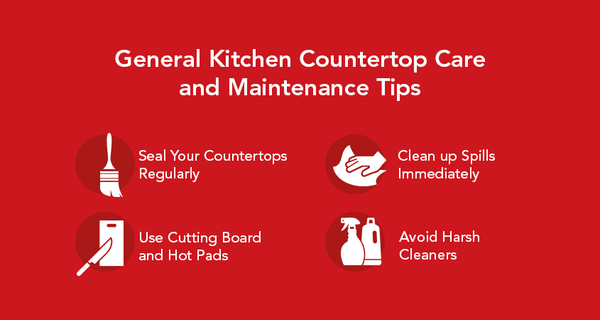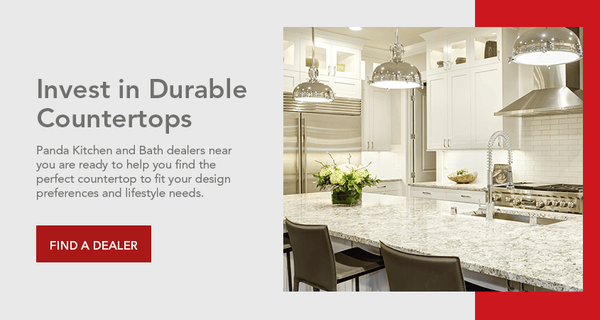Kitchen Countertop Cleaning Guide
Did you know there is a right way to clean your countertops? Especially if you own natural stone counters, your current cleaning methods may be damaging. Luckily, properly cleaning countertops is easier than you think. In fact, you likely already own all the necessary supplies. Follow our countertop cleaning and maintenance guide below to start safely cleaning your counters today.
General Kitchen Countertop Care and Maintenance Tips
Each specific type of counter may have its own unique maintenance requirements. However, there are a few general countertop maintenance tips that apply to most types of surfaces. By incorporating the following tips into your daily routine, you'll keep your counters looking great for years to come.
Seal Your Countertops Regularly
Sealing your countertops is the best way to protect them from staining, scratches and other damages. While sealing is great for cosmetic purposes, it is also crucial for keeping your countertops safe from bacteria growth.
Natural stone countertops are often porous, so without a proper sealant, food, water and any other substance that comes in contact with the surface can seep into the material. Once a substance enters these pores, it's difficult to clean, which makes it easy for stains and bacteria growth to occur.
Clean up Spills Immediately
With or without a countertop seal, you'll want to address any spills immediately. Cleaning spills immediately prevents discoloration or staining.
Use Cutting Boards and Hot Pads
Even the most durable countertops can be damaged if they are not used properly. Always use a cutting board while chopping or cutting any food. Cutting directly on your counters will create scratches or etchings on the surface. These will look unappealing on their own, but they can also become discolored and susceptible to bacteria growth.
Hot pots or pans can also pose a threat to your counters. Placing hot cookware on your kitchen countertops can cause discoloration or even cracks in the surface. Trivets or hot pads are affordable ways to protect your countertops from any heat damage.
Avoid Harsh Cleaners
Harsh cleaners like bleach or ammonia actually do more harm than good to your counters. While you want to thoroughly clean your counters to keep you and your family safe, harsh cleaners can be abrasive. In some cases, these harsh chemicals can even remove your protective countertop seal, which will lead to even more sanitary issues like bacteria growth discussed earlier.
Your kitchen countertop dealer may sell or suggest special cleaners for your specific type of countertop, or some warm water and gentle liquid dish soap should do the trick for safely cleaning your counters.

How to Clean Quartz Countertops
While a simple solution of warm water and mild dish soap is great for everyday cleaning, sometimes your quartz countertops will need a little extra attention. Even with a good maintenance routine, mistakes can happen, leaving you with a stain. When this happens, use the following quartz countertop cleaning tips to get your beautiful kitchen back.
Start by using an adhesive remover like Goo Gone to remove any sticky residue from your countertops. Pour the adhesive remover directly onto the dirty area and allow it to sit for 5-10 minutes. Wipe off the area and use a warm water rinse to ensure all of the adhesive remover has been cleaned off.
You could also wet a rag with isopropyl rubbing alcohol. Scrub the stained area with the rag, and when you're done, once again rinse the area with warm water.
Depending on the type of quartz countertop you have, the following step may not apply. If your counter is glass cleaner safe, spray the whole surface and allow it to sit for a few minutes. Use a wet cloth to wipe down the area one last time. If you're unsure if your material is glass cleaner safe, contact your countertop dealer and see what they recommend.
How to Clean Marble Countertops
Marble countertops are a beautiful addition to any kitchen. However, their beauty can become damaged. Oil, lemon juice and tomato sauce can all stain or damage marble. That's why it's so important to quickly clean up any spills on marble counters. If you do notice etching and staining, or you just want to give your countertops a good clean, follow the cleaning methods for different needs below.
General Cleaning
Combine mild dish soap and warm water together. This mixture can be added to a spray bottle or directly onto a sponge. Spray your counter or apply the soapy sponge and begin to scrub the area. Rinse the soap from the sponge and use only warm water to remove any remaining soap. Use a microfiber towel to buff the area dry. Since water can stain marble, you may want to take a second towel and ensure the surface is completely dry.
Etching
If you notice etching while cleaning your stone countertop, use a mild abrasive, like super fine steel wool, to smooth the surface without further damaging your counter. Remember to wear gloves will buffing your counter, or call a professional to do the job for you.
Staining
Oil stains make your marble countertop darker. To lighten these areas:
- Take a white paper towel and rip it into very small pieces.
- Place these pieces in a bowl and spray them with hydrogen peroxide.
- Cover the oil stain with these wet paper towel pieces and cover it all with plastic wrap.
- Make holes in the plastic wrap for airflow, then allow the mixture to dry completely, which could take up to a day.
While you want your oil stains to lighten, you also don't want to make them too light. Periodically check on how the stain is lightening to make sure your final result is a color that works for your countertops. When you're done treating the oil stains, use the general cleaning method listed above to remove any excess hydrogen peroxide.
How to Clean Granite Countertops
Granite counters are a popular choice due to their durability and stunning design. Treating and cleaning granite counters is similar to the methods used for marble. For general cleaning of your granite countertops, use the soap and water method, or opt for a specialty cleaning solution. The steps for cleaning a granite countertop are as follows:
- Dish soap and water method: Combine no more than a half tablespoon of mild dish soap to warm water. Soak a soft cloth in the soapy mixture and ring it out until it is just damp. Wipe the counter in a circular motion until clean.
- Granite-specific cleaner method: Purchase a daily cleaner made specifically for your granite countertops. Speak with your countertop dealer if you're unsure where to buy this cleaner. Spray the cleaner over the surface and allow it to sit for a few minutes. Rinse the surface with water and a soft towel. Ensure the solution has been cleaned off thoroughly and then use a microfiber towel to dry the area.
- Disinfectant method: Sometimes, your countertop just needs a quick disinfectant instead of a full scrub. Mix a solution of equal parts water and equal parts isopropyl rubbing alcohol, spray it over the counter and wipe dry.
When faced with staining or etching, follow the same cleaning procedures mentioned for marble countertops.
Invest in Durable Countertops
Every part of your house needs cleaning once in a while, but durable, high-quality countertops from Panda Kitchen and Bath will make the process easy and keep your kitchen looking beautiful. Your local PKB Cabinetry dealers are ready to help you find the perfect countertop to fit your design preferences and lifestyle needs.





